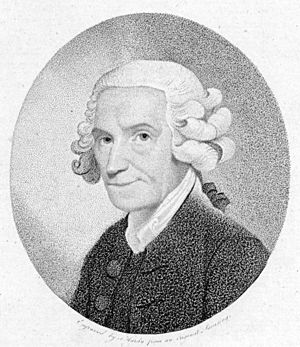James Nares (composer) facts for kids
Quick facts for kids
James Nares
|
|
|---|---|

James Nares by Thomas Hardy
|
|
| Background information | |
| Born | 19 April 1715 Stanwell |
| Origin | Norwich |
| Died | 10 February 1783 (aged 67) |
| Genres | Classical |
| Occupation(s) | Composer, musician |
| Instruments | Organ, harpsichord |
James Nares (born April 19, 1715 – died February 10, 1783) was an English composer. He wrote mostly religious songs and music for voices. He also composed music for the harpsichord (an old keyboard instrument) and the organ.
Contents
Life of James Nares
James Nares was born in Stanwell, England. Soon after he was born, his family moved to Oxfordshire. His brother, Sir George Nares, became an important judge.
Early Career and Education
Nares started his music career at St. George's Chapel in Windsor Castle. He was the Deputy Organist there. In 1735, he became the main Organist at York Minster. He got married around that time.
James Nares learned from several great musicians. His teachers included Bernard Gates, who was in charge of the King's Choristers. He also studied with Johann Christoph Pepusch and William Croft. A good friend and supporter of Nares was John Fountayne, who was the Dean of York.
Chapel Royal and Later Life
In 1756, Nares took over from his old teacher, Bernard Gates. He became the chorister at the Chapel Royal. This is a special group of singers who perform for the royal family. Around this time, the University of Cambridge gave him a special degree. He became a Doctor of Music.
After being an assistant organist in Windsor and then the organist at York Minster, he returned to the Chapel Royal. In 1756, he became the organist and composer for King George III. He took over this role from Maurice Greene.
It is thought that James Nares was the first person to publish a series of keyboard lessons. These lessons helped students learn to play the piano.
Nares stopped working in July 1781 because he was not well. He died on February 10, 1783. He is buried in St. Margaret's, Westminster. Many of his musical pieces, especially his anthems (religious songs), are still used in cathedrals today.
James Nares was the father of Revd Robert Nares. Robert Nares (1753–1829) was a writer and studied language.
Musical Compositions
James Nares wrote many different types of music. Here are some of his well-known compositions:
- The Souls of the Righteous, 1734
- Set of eight Harpsichord Lessons, 1747
- Five Harpsichord lessons, Op. 2, 1759
- Elegy on Mr. Handel, 1759
- Il Principio or a Regular Introduction to playing on the Harpsichord or Organ, 1760
- Six Fugues for Organ, 1772
- Three Easy Harpsichord Lessons, 1778
- A Treatise on Singing, 1778
- The Royal Pastoral, 1778
- Collection of Catches, Canons and Glees, 1778
- Six Organ Fugues, 1778
- Second Treatise on Singing, with a set of English duets, 1778
- Twenty Anthems, 1778
- A Morning and Evening Service and Six Anthems, 1788

